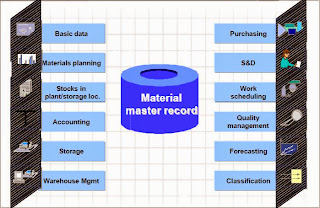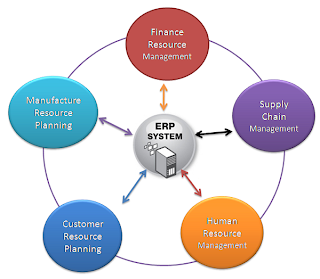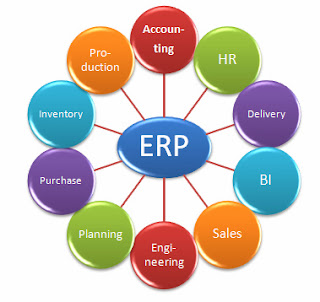Purchase info record:
Purchase info record contains information on a material and vendor of that material. Purchase info record is a source of information with material and vendor combination. The main purpose of purchase info record in SAP is to copy data from info record to all purchasing documents (RFQ, PO, Outline agreements).
Purchase info records can be created manually or purchase info records can be updated automatically in the back ground while entering quotation or purchase order or outline agreement by selecting info update option.
Purchase info records can be created with or without material master and with or without plant.
Types of purchase info records:
1. Standard
2. Pipeline
3. Consignment
4. Sub-contract
Purchase info record contains.........
1. Material Number
2. Vendor Number
3. Plant (if plant specific info)
4. Remainders, Order unit (picked from material master purchasing view)
5. Vendor sales person, contact details etc. (picked from vendor master purchasing view)
6. Return agreement for returns ( in case returns are there)
7. Regular vendor or not
8. Purchasing group ( picked from material master otherwise from vendor master)
9. Planned delivery time (picked from vendor master)
10. Under delivery and over delivery tolerances ( picked from vendor master)
11. Net price
12. Tax code
13. Incoterms (picked from vendor master)
14. Conditions for price, scales,
15. Validity periods etc.
Purchase info record contains information on a material and vendor of that material. Purchase info record is a source of information with material and vendor combination. The main purpose of purchase info record in SAP is to copy data from info record to all purchasing documents (RFQ, PO, Outline agreements).
 |
| Purchase info record in SAP |
Purchase info records can be created manually or purchase info records can be updated automatically in the back ground while entering quotation or purchase order or outline agreement by selecting info update option.
Purchase info records can be created with or without material master and with or without plant.
Types of purchase info records:
1. Standard
2. Pipeline
3. Consignment
4. Sub-contract
Purchase info record contains.........
1. Material Number
2. Vendor Number
3. Plant (if plant specific info)
4. Remainders, Order unit (picked from material master purchasing view)
5. Vendor sales person, contact details etc. (picked from vendor master purchasing view)
6. Return agreement for returns ( in case returns are there)
7. Regular vendor or not
8. Purchasing group ( picked from material master otherwise from vendor master)
9. Planned delivery time (picked from vendor master)
10. Under delivery and over delivery tolerances ( picked from vendor master)
11. Net price
12. Tax code
13. Incoterms (picked from vendor master)
14. Conditions for price, scales,
15. Validity periods etc.








